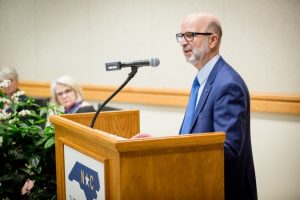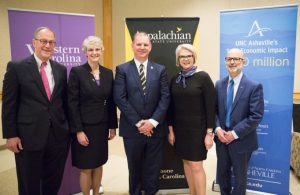UNC System President Margaret Spellings brought her “State of the University” tour to Asheville on April 27, 2018, offering her progress report on the state of the 17 institutions that together make the University of North Carolina.
UNC Asheville Interim Chancellor Joe Urgo who provided closing remarks [see below], Western Carolina University Acting Chancellor Alison Morrison-Shetlar and Appalachian State University Provost Darrell Kruger joined President Spellings for her State of the University address, delivered at the North Carolina Arboretum, an affiliate of the UNC System.
“North Carolina has built, without question, one of the finest university systems in the nation. We are all rightly proud of that, and it’s getting better every single day,” said Spellings. “Our graduation rate is up more than six percent in the last five years. Our annual research funding is up $300 million in that same period. Today, we net more than $1.5 billion in research funding. … We are filling jobs in vital fields, producing nearly 21,000 graduates each year with degrees and certificates in health sciences, engineering, and STEM – a 29 percent increase since 2011. … We have increased our Pell-eligible graduates by more than 20 percent, so we are reaching the broad spectrum of students across the state. … We are getting stronger – no doubt. But it’s no cause for complacency or resting on our laurels. As I like to say, we are pleased but not satisfied,” said Spellings.
“Economic mobility … to me, it’s the defining issue of our time. … Children born in poverty in the South have strikingly low odds of bettering their lives. … But we know we can change that deficit. The data confirm that public universities are a great way to lift low-income students, first-generation students, and really everyone, to a better life. When we meet our core mission — reaching talented students from all backgrounds, getting them in the door, and helping them graduate — college changes lives.”
One positive example Spellings cited of helping students graduate is UNC Asheville’s “First to Finish” program which allows some students to take summer courses for free to keep them on track for graduation. “We’re excited to work with the legislature to expand this approach through the system via our Accelerate through Summer Grant program,” said Spellings.
Known for championing accountability and metrics, Spellings described how she is implementing standards in the UNC System. “I have signed 17 customized performance agreements with each chancellor in the UNC System, all of them embracing measurable outcomes as a route to excellence,” she said. “Our chancellors have signed performance agreements outlining ambitious goals, including 20 and 30 percent increases in critical workforce credentials in teaching, healthcare and STEM. And big increases in rural and low-income enrollments and completions, including a 30 percent increase in low-income completions at Western, a 20 percent increase in rural completions at UNC Asheville, and a 50 percent reduction in the achievement gap for low-income students at App State. … All by 2022.”
Spellings also shared her view of the larger purpose of higher education: “We have to stand behind the core values of free expression, intellectual diversity, and patient engagement with new ideas. Our campuses bring together people from different backgrounds to gather in the same place, debate the same books, and navigate the same social life. A college education remains one of the most integrated and intellectually demanding experiences in American life.

“Our students recognize the privilege of thinking and learning. They want to live up to that gift, to leave the world in better shape than they found it. … It’s up to us to show that public institutions are an ally in the effort to make a better world,” said Spellings.
UNC Asheville Interim Chancellor Joe Urgo closed the presentation with an observation from his perspective leading the state’s designated liberal arts university, that the UNC System must meet critical workforce needs and “prepare North Carolina’s critical thought-force. We face big, complicated, intractable problems: climate change, health care, racial inequities, income disparity, infrastructure collapse, global tensions and hostilities. Continuing to apply the same kind of thinking that got us into these predicaments won’t get us out. We need a critical thought-force.
“We don’t know where the next powerful, innovative, or groundbreaking mind will come from,” said Urgo. “This young mind may belong to a student in a poor neighborhood in an urban area, or be growing up in rural Western North Carolina without access to the internet, or be in an underfunded school, or be born to parents struggling to pay the bills. There may not be two parents. Unless a college education is accessible to all who desire it, how will we find and nurture this promising mind?
“We are embracing the commitment to give all people a fair opportunity to make a better life, to influence social change and progress,” said Urgo. “Higher education may not be, and does not have to be, for everyone; but it ought never to be off-limits to anyone. Our shared roles in transforming the critical thought-force are not just suggestions. They are expectations – higher expectations – for all of us, as we raise the expectations for our students, our future and ourselves. We are making great progress in North Carolina, and we build on a strong foundation. And because we are the University of North Carolina, we know we can do even better.”

To watch streaming video of the complete State of the University address by UNC System President Margaret Spellings, including an introduction by North Carolina Arboretum Executive Director George Briggs, Q&A with Western Carolina University Acting Chancellor Alison Morrison-Shetlar and Appalachian State University Provost Darrell Kruger, and closing remarks by UNC Asheville Interim Chancellor Joe Urgo, visit the UNC Asheville Facebook page (and skip ahead until content begins).
To learn more about President Spellings’ State of the University tour, visit https://www.northcarolina.edu/news/2018/03/State-University-Reason-Celebrate-Call-Action.
2018-04-27

Share
Permalink: